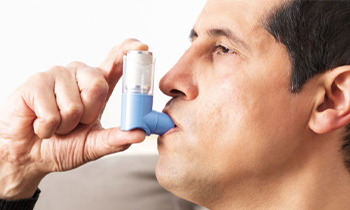Symptoms of Asthma

Shortness of breath

Chest tightness or pain

Wheezing when exhaling (common sign of asthma in children)

Trouble sleeping caused by shortness of breath, coughing or wheezing
Asthma FAQ
Asthma is a disease that affects your lungs. It is one of the most common long-term diseases of children, but adults can have asthma, too.
Asthma causes wheezing, breathlessness, chest tightness, and coughing at night or early in the morning. If you have asthma, you have it all the time, but you will have asthma attacks only when something bothers your lungs.
We don’t know all the things that can cause asthma, but we do know that genetic, environmental, and occupational factors have been linked to developing asthma.
-Genetic: If someone in your immediate family has asthma, you are more likely to have it. “Atopy,” the genetic tendency to develop an allergic disease, can play a big part in developing allergic asthma. However, not all asthma is allergic asthma.
-Environmental: Being exposed to things in the environment, like mold or dampness, some allergens such as dust mites, and secondhand tobacco smoke have been linked to developing asthma. Air pollution and viral lung infection may also lead to asthma.
-Occupational: Occupational asthma occurs when someone who never had asthma develops it because he or she is exposed to something at work. This can happen if you develop an allergy to something at work such as mold or if you are exposed to irritants such as wood dust or chemicals at work over and over at lower levels or all at once at higher levels.
It can be hard to tell if someone has asthma, especially in children under age 5. Having a doctor check how well your lungs work and check for allergies can help you find out if you have asthma.
During a check up, a doctor will ask how often you cough, breathing problems, chest tightness, wheezing and colds. Doctor will also ask family history and other enviromental factors
The doctor may also do a breathing test, called spirometry, to find out how well your lungs are working by testing how much air you can breathe out after taking a very deep breath before and after you use asthma medicine.
An asthma attack may include coughing, chest tightness, wheezing, and trouble breathing. The attack happens in your body’s airways – which are the paths that carry air to your lungs. As the air moves through your lungs, the airways become smaller, like the branches of a tree are smaller than the tree trunk.
During an asthma attack, the sides of the airways in your lungs swell and the airways shrink. Less air gets in and out of your lungs, and mucous that your body makes clogs up the airways.
You can control your asthma by knowing the warning signs of an asthma attack, staying away from things that cause an attack, and following your doctor’s advice. When you control your asthma:
• you won’t have symptoms such as wheezing or coughing,
• you’ll sleep better,
• you won’t miss work or school,
• you can take part in all physical activities, and
• you won’t have to go to the hospital.
Everyone with asthma does not take the same medicine.
Asthma medicines come in two types—quick-relief and long-term control. Quick-relief medicines control the symptoms of an asthma attack. If you need to use your quick-relief medicines more and more, visit your doctor to see if you need a different medicine. Long-term control medicines help you have fewer and milder attacks, but they don’t help you while you are having an asthma attack. Take your medicine exactly as your doctor tells you and stay away from things that can trigger an attack to control your asthma.
Yes. Even though physical exercise is a common trigger of asthma symptoms, it is just as important for people with asthma to exercise as for anyone else.
With the right medication, most people with asthma will be able to do some kind of physical exercise, many will feel no restrictions, and some will only react to exercise in combination with other triggers.
Nebulization is necessary to treat acute asthma attacks. The use of nebulizer at home, particularly in this time of pandemic, is safe for as long as the neb kit is not shared and it is done in an isolated area. Metered-dose inhaler with spacer can be used as an alternative.
Yes, it is. Maintaining asthma control, through regular use of inhaled corticosteroids, is safe for pregnant women. Make sure to follow the prescribed dosage of your doctor.
Asthma Articles
Asthma Videos

Nebulization for Kids: Usage & Maintenance
Ensure your kid's medicine intake with these tips for properly using a nebulizer.

Nebulization for Kids: Preparing the Nebulizer
Using a nebulizer for your kid is easy, especially with these prep reminders.

Using Nebulizers at Home
For safe nebulization at home, watch these tips on what to do before, during, and after using your nebulizer.












